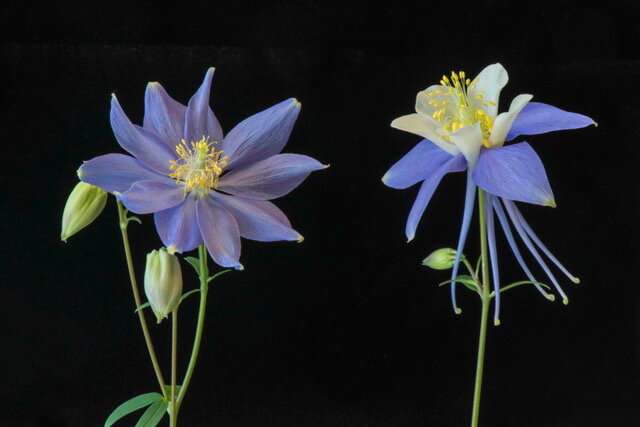
The new columbine doesn’t look as nice but may have a survival advantage:
Hodges, doctoral student Zachary Cabin and their colleagues just have identified a case of a sudden evolutionary change. In the journal Current Biology, the scientists describe a population of columbines that have lost their petals, including the characteristic nectar spurs. A drastic change caused by a mutation in a single gene. The finding adds weight to the idea that adaptation can occur in large jumps, rather than merely plodding along over extended time spans…
Enter the Colorado blue columbine. In one population, a mutation has caused many of the plants to lose their petals with the iconic nectar spurs. While not an uncommon occurrence in columbines, spurlessness seems to have stuck around in this area: About a quarter of the plants lack the distinctive feature.
The team plumbed the plant’s genome to find the source of the unusual morphology. They considered a gene, APETALA3-3, known to affect spur development. They found that this single gene controlled the entire development of the flower’s spurs and nectarines.
“The gene is either on or off, so it’s about as simple of a change you can get,” said lead author Zachary Cabin. “But that simple difference causes a radical change in morphology.”
It turned out the mutant plants actually produced more seeds than their counterparts, much to the team’s surprise. They began combing through their observations, searching for an explanation…
And as the data built up, a clear trend emerged: Deer and aphids preferred flowers with nectar spurs.
University of California Santa Barbara, “Examining sudden evolutionary change” at Phys.org (February 16, 2022)
The team reckons that it has vindicated Goldschmidt’s once widely ridiculed “hopeful monster” thesis.
Reality check: Devolution, as described in Michael Behe’s book, Darwin Devolves, just means that a type of life form may survive better by losing complex equipment. Many examples are available and this sounds like one of them. But it reverses the meaning of “evolution,” which usually refers to increases, not decreases in complexity.
It’s a useful find but if a lineage of peacocks lost the showy tails due to a transmissible genetic defect — but was thus better able to flee predators — that could also be marketed as “sudden evolutionary change.” But what question about the origin of complex life would such terminology engineering really answer?
The paper is open access.
You may also wish to read: Devolution: Getting back to the simple life